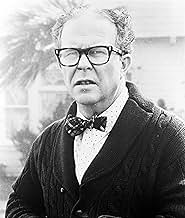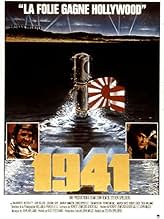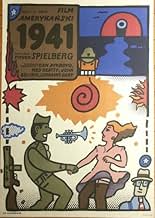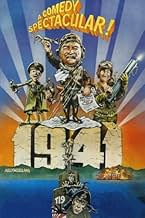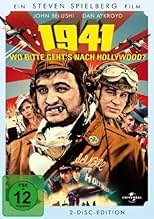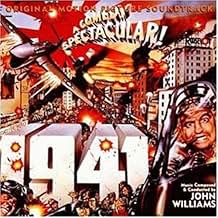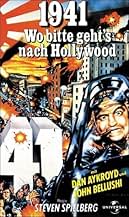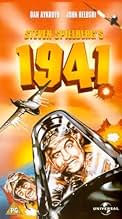CALIFICACIÓN DE IMDb
5.8/10
38 k
TU CALIFICACIÓN
Los histéricos habitantes de California se preparan para una invasión japonesa en los días tras el ataque de Pearl Harbor.Los histéricos habitantes de California se preparan para una invasión japonesa en los días tras el ataque de Pearl Harbor.Los histéricos habitantes de California se preparan para una invasión japonesa en los días tras el ataque de Pearl Harbor.
- Dirección
- Guionistas
- Elenco
- Nominado a 3 premios Óscar
- 6 nominaciones en total
Toshirô Mifune
- Cmdr. Akiro Mitamura
- (as Toshiro Mifune)
Lucille Benson
- Gas Mama (Eloise)
- (as Lucille Bensen)
Jordan Cohen
- Macey Douglas
- (as Jordan Brian)
Elisha Cook Jr.
- The Patron (Dexter)
- (as Elisha Cook)
Opiniones destacadas
i can't believe some of the comments on this movie. did someone really think this was supposed to be an accurate portrayal of wwii california? IT'S A COMEDY! and a good one. i agree that the christmas tree scene shouldn't have been cut, but then again maybe spielberg didn't want to undermine the gritty realism that some reviewers were looking for. p.s. - by far it's mickey rourke's best role.
There comes a time in every new filmmaker's career when a few initial successes makes them feel invulnerable and leads them to believe that they can do anything and get away with it, only for their hubris to be mercilessly destroyed when their next project turns out to be an absolute disaster.
1941 is an end product of Steven Spielberg's hubris that presents the now revered filmmaker tackling the genre of comedy after finding astonishing success with Jaws & Close Encounters, but this time he spectacularly fails at it. Arguably the worst film of his career, 1941 is nothing less than an eyesore.
Set during the Second World War, the story of 1941 follows the hysteria that grips the Californians in the wake of the bombing of Pearl Harbour. As paranoia sets in & chaos erupts all over the state, civilians & soldiers prepare for the Japanese invasion, while a lost Japanese submarine sends its crew to scout out the madness.
Directed by Steven Spielberg, 1941 finds the director trying way too hard in an effort to make the audience laugh but he only ends up making a mess of everything in the process. It appears as if Spielberg simply wanted to blow everything up and had his wish fulfilled with this big budget, big cast comedy that isn't even remotely funny.
The film is an exaggeration of everything. All the set pieces are either destroyed or blown up by the end. People keep falling here n there throughout the movie. All the characters are hyperactive. Performances are equally crazy, and not in a good way. Still, its energetic camerawork, extravagant special effects & John Williams' score is a plus.
On an overall scale, 1941 is a poorly conceived, awfully written & terribly executed example of blockbuster filmmaking and is a rare failure from a filmmaker who would later go on to become one of the greatest storytellers of all time. In retrospect, it's a bitter medicine that Spielberg needed, for 1941 didn't just knock some sense back into him and sober him up but also made him savour his future successes and not take his reputation for granted. A necessary dud.
1941 is an end product of Steven Spielberg's hubris that presents the now revered filmmaker tackling the genre of comedy after finding astonishing success with Jaws & Close Encounters, but this time he spectacularly fails at it. Arguably the worst film of his career, 1941 is nothing less than an eyesore.
Set during the Second World War, the story of 1941 follows the hysteria that grips the Californians in the wake of the bombing of Pearl Harbour. As paranoia sets in & chaos erupts all over the state, civilians & soldiers prepare for the Japanese invasion, while a lost Japanese submarine sends its crew to scout out the madness.
Directed by Steven Spielberg, 1941 finds the director trying way too hard in an effort to make the audience laugh but he only ends up making a mess of everything in the process. It appears as if Spielberg simply wanted to blow everything up and had his wish fulfilled with this big budget, big cast comedy that isn't even remotely funny.
The film is an exaggeration of everything. All the set pieces are either destroyed or blown up by the end. People keep falling here n there throughout the movie. All the characters are hyperactive. Performances are equally crazy, and not in a good way. Still, its energetic camerawork, extravagant special effects & John Williams' score is a plus.
On an overall scale, 1941 is a poorly conceived, awfully written & terribly executed example of blockbuster filmmaking and is a rare failure from a filmmaker who would later go on to become one of the greatest storytellers of all time. In retrospect, it's a bitter medicine that Spielberg needed, for 1941 didn't just knock some sense back into him and sober him up but also made him savour his future successes and not take his reputation for granted. A necessary dud.
Any movie that features the following....:
1. The Geek from "I Wanna Hold Your Hand" torturing The Mayor from "Jaws" 2. A bunch of Japanese soldiers disguised as walking Christmas Trees 3. A hilarious USO dance sequence that boils over into an inter-service street fight 4. the film debut of Mickey Rourke and the big film debut of John Candy
and last but not least
5. Tough guy Robert Stack crying and singing along to songs from the Disney classic "Dumbo".....
CANNOT BE ALL BAD!!!!!
1. The Geek from "I Wanna Hold Your Hand" torturing The Mayor from "Jaws" 2. A bunch of Japanese soldiers disguised as walking Christmas Trees 3. A hilarious USO dance sequence that boils over into an inter-service street fight 4. the film debut of Mickey Rourke and the big film debut of John Candy
and last but not least
5. Tough guy Robert Stack crying and singing along to songs from the Disney classic "Dumbo".....
CANNOT BE ALL BAD!!!!!
As outlandish and hysterical as the war insanity of 1941 may seem, the plot tracks almost exactly a real incident reported the night of Feb. 24, 1942, in Los Angeles that began when Navy intelligence reported an attack by unidentified objects on their radar could be expected within the next 10 hours. Early the morning of the 25, radar tracked objects 120 miles west of Los Angeles and a blackout was ordered, triggering a flood of reports about enemy planes. Planes wre reported by the coast artillery near Long Beach (25 of them at 12,000 feet). Four batteries of anti aircraft guns at Santa Monica opened fire on a balloon with a flare and all hell broke loose, with so much ack-ack and searchlights scanning the sky that utter confusion reigned for at least three hours with reports of swarms of planes (hundreds in some cases) flying in at every altitude imaginable. Some 1,440 rounds of ammunition were fired at airplanes that never dropped a single bomb. There were reports four enemy planes had been shot down, including one that supposedly landed in flames at a Hollywood intersection. If this all sounds familiar, read on. At dawn, the only damage found was caused by stray ack-ack fire and traffic wrecks during the blackout. The Navy said the next day there were no enemy planes. The Army interviewed people and decided there were at least one to five planes over LA. The War Department then announced the planes must have come from secret air fields in California or Mexico or from Japanese submarines. The next day the Los Angeles Times criticized the "considerable public excitement and confusion" caused by the alert that scared 2 million people. One California politician wanted to know if it was a calculated prank to move California's defense industries inland to other states. The Washington Post followed on Feb. 27 with condemnation of the military's stubborn silence on the issue and the New York Times jumped in on Feb. 28 by calling the entire episode "incredible" and a display of "expensive incompetence." The movie is a wonderful glimpse of this real hysteria, a real incident and with quotes pulled right out of newspaper articles. When Robert Stack wants to know "where are the bombs?" that is the same question the Air Force and Navy asked when reports came in about the thousands of planes attacking LA. All this information is available from government files on Air Force history from the Government Printing Office in Washington, D.C. The Japanese, by the way never flew planes over LA, but did fly over Seattle, they said after the war. I LOVE 1941. It got everything absolutely right. Right down to Belushi's plane crashing into the street and crazies going off searching for hidden airfields near Bakersfield or Barstow or where ever. This was NOT a comedy. It was just about comical people. It should have won an Oscar for BEST DOCUMENTARY.
1941 is a unique movie. 1 part of it is animal house-esque lowbrow humor, 1 part is B-movie love story, and 1 part stoic war movie, and 2 parts insane hilarity.
It is a weird mix to say the least.
First, the problems: 1. The first half of the movie is slow. It grinds on making you wonder why you're watching this movie.
2. The "Love story" subplot is poorly executed for what this movie is trying to do.
3. many of the actors are not used to their fullest potential (especially Dan Akroyd and John Candy) while others receive excessive screen time. (see: The slow moving love story sub-plot) But then there are the good aspects: 1. John Belushi is hilarious. He would have been funnier had he interacted with more characters rather than appearing in many solo shots, but he was funny.
2. The "Epic Battle" was great. It had me laughing as my sides hurt.
3. Slim Pickens: His appearance in the movie was truly where the movie stopped being slow, and the fun really started. He was great in his scenes and between the dialogue and his visual scenes, you can't help but laugh.
There's more, but in short, if you don't mind sitting through a slow build up, the payoff is worth the wait.
It's not the best movie ever, but in the barren entertainment landscape that is Weekend Television: Finding this movie can be like an oasis in the desert. It's solid Saturday afternoon fun.
It is a weird mix to say the least.
First, the problems: 1. The first half of the movie is slow. It grinds on making you wonder why you're watching this movie.
2. The "Love story" subplot is poorly executed for what this movie is trying to do.
3. many of the actors are not used to their fullest potential (especially Dan Akroyd and John Candy) while others receive excessive screen time. (see: The slow moving love story sub-plot) But then there are the good aspects: 1. John Belushi is hilarious. He would have been funnier had he interacted with more characters rather than appearing in many solo shots, but he was funny.
2. The "Epic Battle" was great. It had me laughing as my sides hurt.
3. Slim Pickens: His appearance in the movie was truly where the movie stopped being slow, and the fun really started. He was great in his scenes and between the dialogue and his visual scenes, you can't help but laugh.
There's more, but in short, if you don't mind sitting through a slow build up, the payoff is worth the wait.
It's not the best movie ever, but in the barren entertainment landscape that is Weekend Television: Finding this movie can be like an oasis in the desert. It's solid Saturday afternoon fun.
¿Sabías que…?
- TriviaSome scenes were so noisy during filming that the crew could not hear Steven Spielberg yell "Cut". He had to fire a prop machine gun in the air to get the action to stop.
- ErroresHerbie and Claude change position on the ferris wheel. Spielberg did that deliberately for comedic effect.
- Citas
Japanese soldier: [trying to squeeze a large radio into the sub] We've got to figure out how to make these things smaller!
- Créditos curiososEnd credits feature scenes showing cast members screaming.
- Versiones alternativasThe version released on network television and VHS/DVD/laserdisc is Spielberg's original director's cut, running 146 minutes, fleshing out sub-plots and characterizations, including:
- Wally and Dennis getting thrown out onto the street by Mr. Malcomb after he fires them from the diner where they work.
- Miss Fitzroy lecturing a group of women, Betty and Maxine among them, about tonight's USO dance which is interupted by a group of Army service men and Sailors entering and chanting wanting the women.
- A department store scene with Wally fussing about buying an expensive new zoot suit and Dennis sounding a phoney air-raid siren which leads to panic in the store including a gun-toting Santa Claus yelling out command orders which is revealed to be a set up by Wally who walks out of the store wearing the zoot suit while Dennis meets the twin girls for the first time.
- A scene with Scioli outside his house arguing with his non-English speaking wife about converting their car into an armored car while talking with Claude about sending him and someone else atop the Santa Monica ferris wheel on a spot mission for Japanese planes.
- A extra scene with Ito and the I-19 Japanese submarine shore party disguising themselves as Christmas trees in a remote Christmas tree lot and the drunken Hollis Wood trying to "chop" them down which leads to his capture.
- Scioli arriving at the ferris wheel with Claude and Herbie and explaing to them about their mission in the ferris wheel.
- A dinner scene at the Douglas home and Ward explaining to Betty about her going to the USO dance and telling her about the pros and cons about meeting servicemen.
- A barracks scene with Odgen Johnson Jones arriving for the first time at the barracks and imediately quarling with the racist Foley about property lines within their quarters.
- A scene outside the USO club where Wally arrives and meets with Martinez and his Zoot Suit friends where they are denied access to the club where Corporal Stretch shows up and sets Wally's zoot suit afire which nearly leads to a riot between the Zoot Suiters and the Servicemen. Wally then meets Dennis dressed up as a Marine in order to gain entrance into the club with the twins as his dates.
- Additional dialoge between Captain Birkhead and Donna in their car on the way to the airstrip and being afraid of the dark.
- Another barracks scene where Sergeant Tree breaks up a fistfight between Jones and Foley by informing them about the riot on Hollywood Blvd. and showing them climing into their tank and starting it up.
- A scene of the Japanese submarine I-19 arriving for the first time outside the Douglas house and the sub's entire crew on the deck watching Joan Douglas taking a bath through the bathroom window.
- A scene of the tank traveling down a residential street and Wally shooting up Officer Miller's police car to pieces, sending the policeman and some paserby's running for their lives.
- ConexionesFeatured in At the Movies: Special Show: The Magic of Spielberg (1984)
- Bandas sonorasDown by the Ohio
Music by Abe Olman (uncredited)
Lyrics by Jack Yellen (uncredited)
Performed by The Andrews Sisters
Courtesy of MCA Records, Inc.
Selecciones populares
Inicia sesión para calificar y agrega a la lista de videos para obtener recomendaciones personalizadas
Detalles
- Fecha de lanzamiento
- País de origen
- Idiomas
- También se conoce como
- The Night the Japs Attacked
- Locaciones de filmación
- Gold Beach, Oregón, Estados Unidos(opening scene with sub)
- Productoras
- Ver más créditos de la compañía en IMDbPro
Taquilla
- Presupuesto
- USD 35,000,000 (estimado)
- Total en EE. UU. y Canadá
- USD 31,755,742
- Fin de semana de estreno en EE. UU. y Canadá
- USD 2,701,898
- 16 dic 1979
- Total a nivel mundial
- USD 92,455,742
- Tiempo de ejecución1 hora 58 minutos
- Color
- Relación de aspecto
- 2.39 : 1
Contribuir a esta página
Sugiere una edición o agrega el contenido que falta



